- Home
- Upton Sinclair
Presidential Mission
Presidential Mission Read online
EARLY BIRD BOOKS
FRESH EBOOK DEALS, DELIVERED DAILY
BE THE FIRST TO KNOW—
NEW DEALS HATCH EVERY DAY!
Presidential Mission
A Lanny Budd Novel
Upton Sinclair
MY FRIENDS AND READERS IN BRITAIN who during the eight years of Lanny Budd have been carrying a heavy burden, and who are now engaged in installing democratic Socialism, a task of vital importance to the world.
Author’s Note
Thanks of both author and readers are due to Mr. Eric Erickson, Swedish-American oil man, for permission to give a glimpse of his strange wartime adventures in Germany. The same to Mr. Kenneth Pendar, United States vice-consul in North Africa, for permission to present him and his experiences, charmingly told in his book, Adventure in Diplomacy (Dodd, Mead & Co.).
The same to Mr. Louis Adamic, for permission to have Lanny Budd present at the occasion of a certain dinner at the White House. He told me this story soon after the dinner occurred, and I asked him to write notes of the affair and permit Lanny Budd to be present. The scene was written in accordance with the notes that dealt with the dinner and nothing else. Subsequently, Mr. Adamic expanded the notes into a book, Dinner at the White House (Harper & Brothers).
UPTON SINCLAIR
BOOK ONE
So Nigh Is Grandeur to Our Dust
1
Humanity with All Its Fears
I
Lanny Budd’s heart was high as he drove northward along the Palisades. Hardly a day during the past six months had passed that he had not imagined this hour when he would make his report to the Big Boss—what he would say and what the Boss would answer. Six months is a chunk out of any man’s life, and Lanny’s had been crowded with new experiences. He had been all the way round the earth, and most of the trip near the equator, where the distance is greatest. Meantime that earth had been witnessing events of pain and terror, cataclysms so momentous that men would continue to write and talk about them so long as there was anybody on the planet able to know what had happened in its past.
The sun was shining warm on this early April afternoon. Small white clouds drifted across the blue sky, above apple orchards wreathed in pink satin blossoms, to welcome a world traveler home. The well-paved highway wound irregularly along the wooded cliffs, dipping now and then into hollows, or coming out upon open places where a driver could observe the broad sweep of the river, the railroad on the opposite shore, the villages, and the hills dotted with farmhouses and country mansions. Lanny, who delighted in motoring, had not had a steering wheel in his hands for half a year. He had come from the snows of Archangel and the fogs of Newfoundland; and here was warmth, sunshine, beauty, comfort—all the gifts of nature and of civilization which an American of the leisure classes takes for granted and appreciates only after he has been traveling in wild and poverty-stricken lands, or amid scenes of war and destruction.
The warmth seeped in through the traveler’s skin, the orchard scents through his nostrils, and the beauty through his eyes. His subconscious mind absorbed these while his conscious mind was busy with the great man he was going to see, the story he had to tell him, and what questions would be asked and what answers given. Lanny had missed so much, in these days when significant events came piling one on top of the other, hardly giving people time to realize any of them. America had been at war for a matter of four months, and it had been one defeat after another, with not a single success. Bataan had just surrendered, and the Japanese were close to India; the Germans were close to Leningrad and to the Suez Canal. Lanny thought: F.D.R. is the man who will know about everything. How much will he tell me and what will he want me to do?
II
After a drive of an hour and a half the motorist came to the high Poughkeepsie bridge and crossed over to the east bank of the river. He drove through the spread-out city with the queer Indian name and on up the post road to the north. This road was wide and fairly straight, arched by tall elm trees and lined with the fences and gates of country homes. Soon it was a village called Hyde Park, and then it was an estate called Krum Elbow, for the past nine years the “summer White House.” Lanny had been here just before setting out upon his long journey. That time he had been smuggled in by the back door in the night and had seen his Chief lying in bed, wearing pongee pajamas and a blue crew-necked sweater, which he wouldn’t part with even after the moths had devoured parts of it. Only once had the visitor entered this estate in the normal way, the first time, before he had become a secret agent for the most powerful man in the world.
At the little sentry-box by the entrance gate there had formerly been a State Trooper; now it was wartime, and the United States Army had taken over. The driver stopped his car and gave his name to the sergeant in command. The sergeant had a list, no doubt, and knew it by heart. He surveyed conventionally dressed gentleman in his early forties, wearing a tropical worsted suit of brown, a tie and a homburg hat to match; a little brown mustache, a friendly smile, and a sun tan not entirely lost in the snows of Russia. “I have to see your driver’s license, Mr. Budd,” said the man; and then: “I have to look in the trunk of your car.” It was a sport car with a rumble seat, and anybody who had been hidden there would have had to be of jockey size. Lanny said: “It isn’t locked.” The sergeant took a glance and then said: “O.K., sir.”
The car sped up the drive, through a lane of shade trees which their owner loved—he was pleased to describe his occupation as “tree grower” instead of President of the United States, a less dependable job. The mansion was something over a hundred years old, two-and-a-half stories, partly brick and partly stone; it had been added to now and then, each time in a somewhat different style of architecture. At the front entrance was a semicircular portico with four white columns, and here was a sentry who gave Lanny an informal salute but did not stop him. His coming must have been announced by telephone, for the door was opened without his having to ring, and a Negro butler took his hat; a woman secretary greeted him cheerfully.
III
In front as you entered this family home was a grandfather’s clock, and at the right a circular stairway with carved banisters. The way to the library was at your left, and as you turned in that direction you were confronted by a statue of the President as a youth, a life-size seated figure rising out of a square block of stone. There was a passageway, and a descent of three or four stairs, and at one side a ramp on which a wheel chair might be moved. Wherever the President sat, the wheel chair was near, and a button which he might press to summon his Negro attendant.
The library formed the left wing of the building and was of generous size. There was a fireplace at each end; in front of one was a large flat-topped desk, and sitting behind it was the man Lanny had come to see—a large man, with large shoulders and head and a frank, cheerful face known to most of the world. He was on the alert for his visitor and did not consider it necessary to pretend to be preoccupied; his face lighted up and he held out a welcoming hand from a distance. “Hi, Marco Polo!” In the dozen visits that Franklin Roosevelt had received from his secret agent he had never failed to think up some fancy greeting, and this time it was for a man who had traveled all the way across China. He added: “By golly, I can’t tell you how I have missed you!”
“You have had enough to occupy your mind.” The visitor smiled. He looked with curiosity at this great, crippled man who carried an Atlas load upon his broad shoulders. F.D.R. was a little thinner, a little more careworn, but never more cheerful, for he liked people to come to see him, especially when they had interesting reports to deliver.
“Make yourself at home,” he said and signed to a tall chair beside his desk, one of two “gubernatorial chairs” which he h
ad earned, one for each term he had served in his native state. Lanny saw that the desk had toy elephants and donkeys, billikins, snake rattles, all sorts of odds and ends that admirers sent him; also a formidable stock of official documents which he would have to dig his way through, but not this afternoon. He had come to Hyde Park for a week end of badly needed rest, and talking to Presidential Agent 103 was one of his ways of diversion.
“You are able to get about all right?” was his first comment. “Tell me just what happened.”
“My plane cracked up in a terrific storm, and when it hit the sea both my legs were smashed. But they’re all right now, and ready for duty.”
“I thought to myself when I heard about it: he’ll be one man who can understand my plight!”
“Believe me, Governor, there wasn’t a day in the hospital and afterward that I didn’t have that same thought.”
“You were luckier than I, you could hope for a comeback.”
“I was more lucky than any man had better count on. I don’t know if I ever told you that an astrologer had predicted that I would die in Hongkong. I had several close calls there, and almost got converted to a belief in the stars.”
“Alston tells me that you were married instead.” Then, with a chuckle: “You know the jingle about needles and pins?”
“Plenty of trouble began there, but it wasn’t due to getting married. Quite the contrary.”
“I wish you happiness, Lanny. You must bring your wife to see us sometime.”
“That will give her pleasure indeed. She is, as you may have heard, a writer of short stories, and has given the Nazis some sharp digs. The Russians were delighted by them.”
“Send them to me and I’ll be glad to read them. Did you see much of Russia?”
“Only Kuibyshev and Moscow, but I had some worth-while talks. You will want to hear first about Stalin, I imagine.” Lanny brought up the subject at the first moment, being aware of his Boss’s fondness for chatting. The caller didn’t want to get diverted, say to the President’s great-great-uncle or great-grandfather or whoever it was that was suspected of having been an opium smuggler in the China Seas; or perhaps to the model of his Yankee Clipper which stood in a glass case against one wall of this ample room.
IV
Lanny Budd launched himself upon a subject which he could be sure was of importance to the Commander-in-Chief of the American Armed Forces. He reported on a two-hour conference with the mystery man of the Kremlin—not so mysterious if you would read some of his published-writings and those of his master, Lenin. But many people find it easier to contemplate a mystery than to read a book, and Lanny doubted Franklin Roosevelt’s ever having seen one of Stalin’s tomes. He described the oval room which was the Soviet chief’s office, and the interview late at night, and the fur coat and boots which had been presented to the emissary from the White House.
“The Embassy here at Washington made inquiry about you and I gave you my O.K.,” said F.D.R. To which the visitor replied: “I guessed that must have happened, because Stalin was so frank and gave me several messages for you.”
“The thing we want to know most of all, Lanny, is whether they will stick it out in this war.”
“As to that I am sure you need have no fear. They have seen too much of Nazi brutality, which is really quite insane. A Russian would as soon trust a Bengal tiger as take the word of a Hitlerite. Stalin’s reply to my question was prompt and decisive. They are in this war to the finish, and only beg that you will get help to them as quickly as possible.”
“We will do our best, Lanny, but we have almost nothing at present. Our shortage of shipping is paralyzing, and the U-boats are playing the very devil with us. The Russians expect a heavy attack this spring, I assume.”
“They do, and cannot be sure where it will come; that is the disadvantage of defensive warfare. The best guess is that Hitler will concentrate on the south because of the oil, which is his greatest need. It will be an overwhelming attack; he has not been nearly so heavily hit as the Soviet communiqués would have us believe. His retreat was strategic, to prepared winter positions, and not many of his troops were sacrificed. He will no doubt throw in everything he has as soon as the ground is dry. There are millions of Russians, now strong and happy, who will be food for the wolves and the kites when the steppes are dry.”
The smile had gone from the President’s face, and instead there was a mask of grief, which silenced his secret agent. “You know, Lanny, I never dreamed I’d be a war president. It is a thought I could hardly have faced.”
Lanny did his best to meet this mood. “Lincoln didn’t want it, Wilson didn’t want it, I doubt if any of our war presidents ever did or will. You are in the hands of fate, sir; and history will record that you did your job well.” Lanny guessed that this was what Roosevelt lived for, the fountainhead from which he drew his courage and confidence; he was making history that men would study and from which they would renew their faith in democratic principles.
The visitor went on with his story. He told everything the Red dictator had said, including the assertion that he was not a dictator. He repeated the questions Stalin had asked about Roosevelt; questions all to the point, revealing a knowledge of America that extended even to Hearst and Colonel McCormick and their newspapers, whose main purpose appeared to be to misrepresent the Soviet Union. Then Lanny underwent an inquisition similar to the one he had gone through in Moscow. What did Stalin look like, what was his manner, what appeared to be the state of his health? Lanny reported that he spoke quietly and paid close attention to every reply. He was in his sixties, but only gray hair and mustache betrayed his age.
“A curious thing,” the President said. “I had the impression that he was a big man, but they tell me this is not so.”
“I would guess him to be four inches shorter than I, and I am five-ten; but he is sturdily built. His training has been that of a revolutionary, a hunted man under the tsardom, and it must be hard for him to imagine the free institutions which you and I take for granted. It must be hard for him to realize that men born to wealth and comfort like ourselves can be genuinely interested in the abolition of their own privileges. But when I proposed a toast to the progress of democracy throughout the world, Stalin drank to it without hesitation. Of course he has his own definition of the word, and his own idea of how to attain the goal. If he is to be persuaded that our way is better, it will have to be by actions, not by words.”
V
Everything about the Soviet Union and then everything about China. F.D.R. stuck another cigarette into the long thin holder which he affected, lighted it with a patent lighter, and started another inquisition. He wanted to know what life was like in the interior of a land which had been at war for ten years. How did the people appear, and what were they doing and saying? Had the travelers seen any signs of starvation, and what had they used for money, and how much did the common people know about what was going on in the outside world? “They all know about you” Lanny said with a grin, “and they are all sure you are going to send them several thousand airplanes by next Tuesday.”
“Alas, I would not dare tell them how few planes we have, Lanny. I won’t tell even you. It will be impossible to get anything to them for some time.”
“The intelligent ones realize that. They say they are worse off since we entered the war. They used to get some goods by smuggling or by bribing Jap officials. Now they get nothing.”
“It is of the utmost importance that China should not collapse, Lanny. We can only make promises, but we do this with real sincerity. We are surely going to smash the Jap warlords, and then it will be possible for a peaceful and democratic China to exist.”
“That is what I told them everywhere. I took the liberty of saying that I was a special emissary of yours, sent to give them assurances.”
“You are that wherever you go, Lanny. I understand that you were in Yenan. Tell me about that. I hear such contradictory reports.”
So this “Mar
co Polo” described “Red China,” the land in the north and northwest to which the Communist armies had marched when expelled from the rest of the country, and where they were now building a crude, pathetic utopia, mostly in caves chopped out of cliffs where the Jap bombers couldn’t reach them. Lanny told of the odd impression this life had made on him; it wasn’t Marxist and certainly not Leninist, it was early American utopian; it was a “colony,” a “phalanstery,” a “commonwealth.” Its people did not talk about class struggle; they talked about co-operation and brotherhood and worked at it with apostolic zeal.
“Then they are not trying to socialize industry?” asked the President. The answer was: “It was carefully explained to me that their theoreticians have decided that at this stage they must promote private industry as a means of overcoming feudalism.”
“A sort of N.E.P.,” commented the other. “That ought to make it easy to get along with them.”
“One might think so. But unfortunately the Chungking government wants to perpetuate feudalism under the label of democracy. They maintain a strict blockade of Yenan, and we were told that it would be impossible to get there. We did manage it, but it was an uncomfortable journey, and not without its dangers.”
“Every nation wants to continue its civil wars, it appears, even while it is being crushed by the Japs or the Germans.”
“Even after it has been crushed, Governor. That is the situation in France, and among every group of refugees I have met anywhere.”
“It is sad,” was the reply. “But the problem seems very simple. We are going to fight Japs and Germans and break their military systems. That is the only thing that counts with us, and we are not going to fight anybody’s civil wars, not in China, nor in France, nor in Italy, nor wherever our troops may go. When it is over, we’ll see that all the countries have a fair democratic election, and after that they will be on their own.”

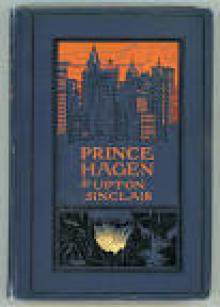 Prince Hagen
Prince Hagen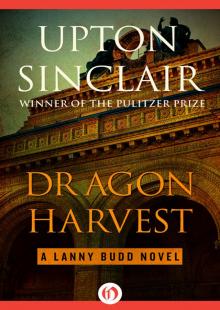 Dragon Harvest
Dragon Harvest The Jungle
The Jungle Sylvia's Marriage
Sylvia's Marriage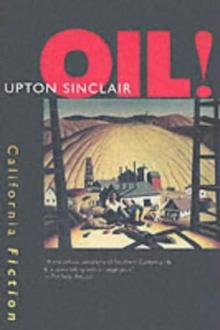 Oil! A Novel by Upton Sinclair
Oil! A Novel by Upton Sinclair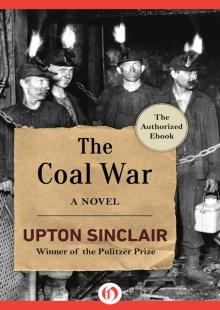 The Coal War: A Novel
The Coal War: A Novel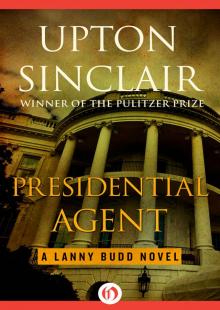 Presidential Agent
Presidential Agent World's End
World's End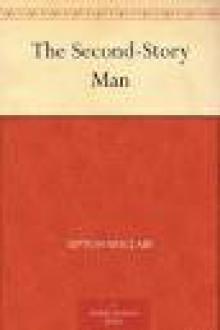 The Second-Story Man
The Second-Story Man O Shepherd, Speak!
O Shepherd, Speak!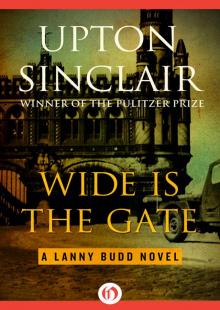 Wide Is the Gate
Wide Is the Gate The Return of Lanny Budd
The Return of Lanny Budd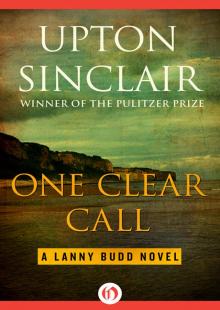 One Clear Call I
One Clear Call I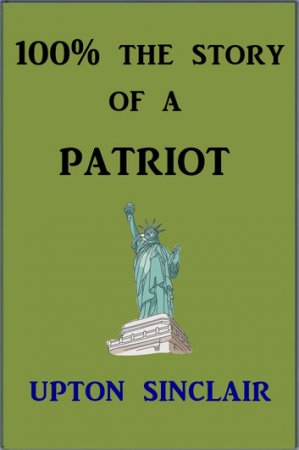 100%: the Story of a Patriot
100%: the Story of a Patriot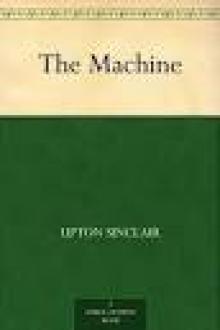 The Machine
The Machine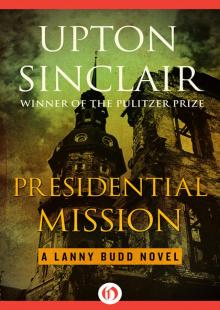 Presidential Mission
Presidential Mission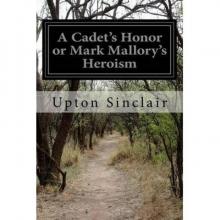 A Cadet's Honor: Mark Mallory's Heroism
A Cadet's Honor: Mark Mallory's Heroism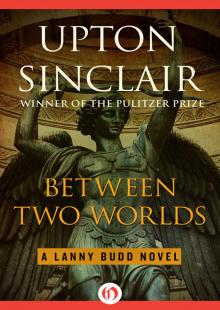 Between Two Worlds
Between Two Worlds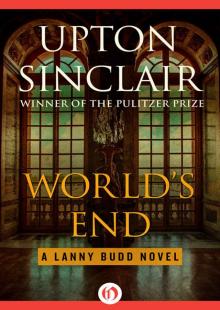 World's End (The Lanny Budd Novels)
World's End (The Lanny Budd Novels)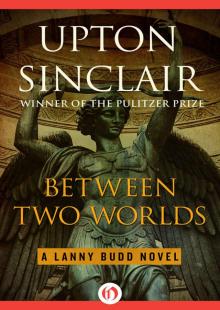 Between Two Worlds (The Lanny Budd Novels)
Between Two Worlds (The Lanny Budd Novels)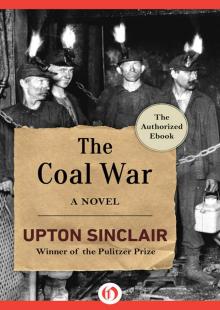 The Coal War
The Coal War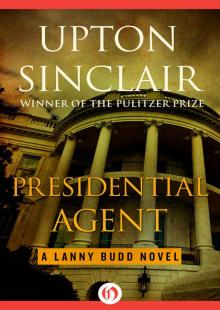 Presidential Agent (The Lanny Budd Novels)
Presidential Agent (The Lanny Budd Novels)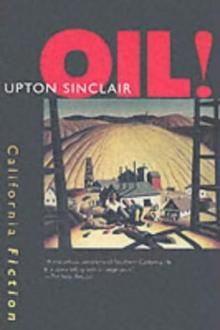 Oil (filmed as There Will Be Blood)
Oil (filmed as There Will Be Blood)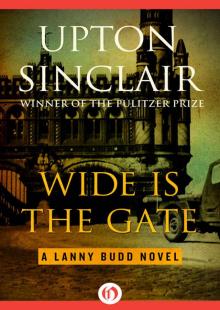 Wide Is the Gate (The Lanny Budd Novels)
Wide Is the Gate (The Lanny Budd Novels)